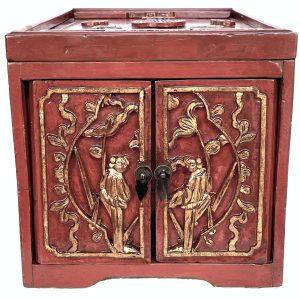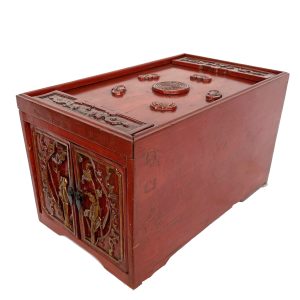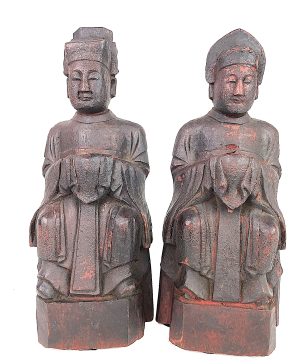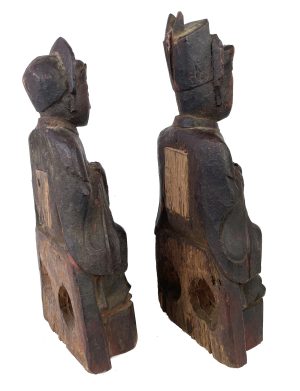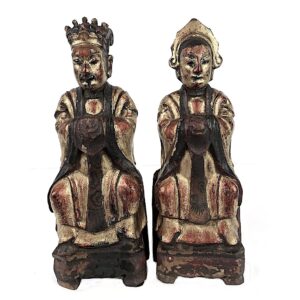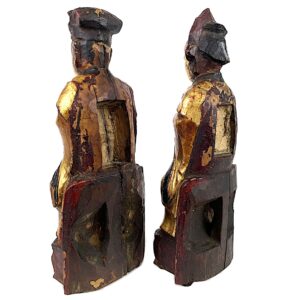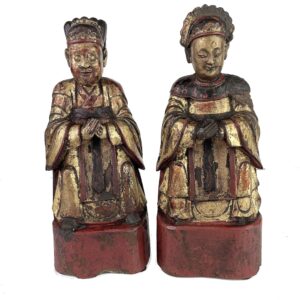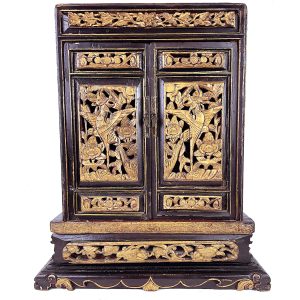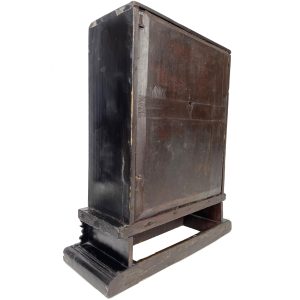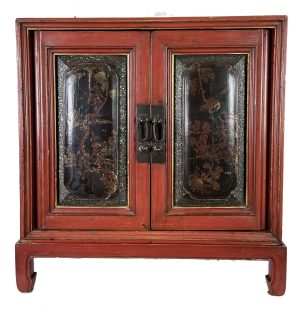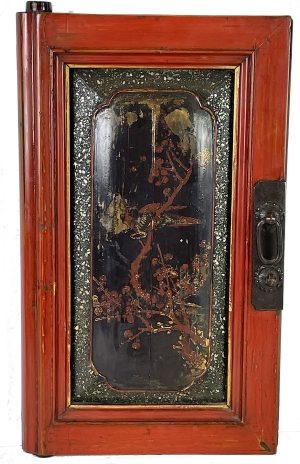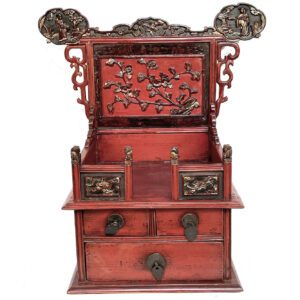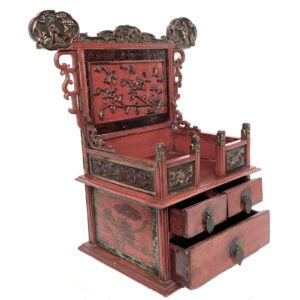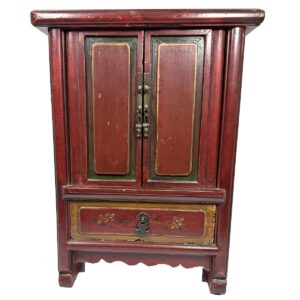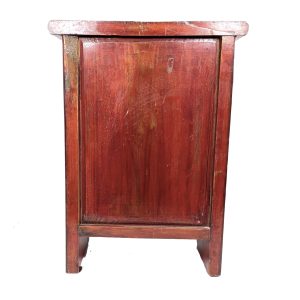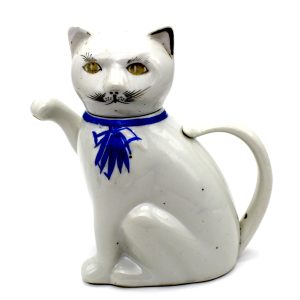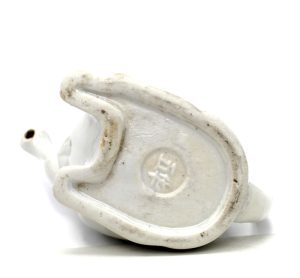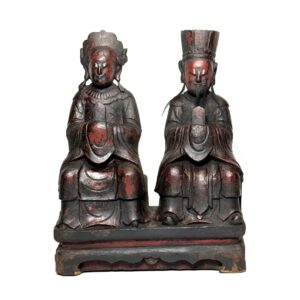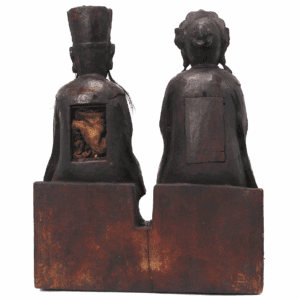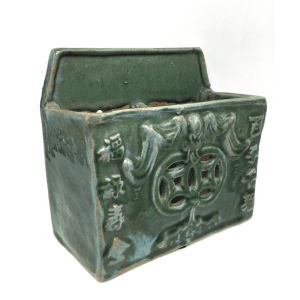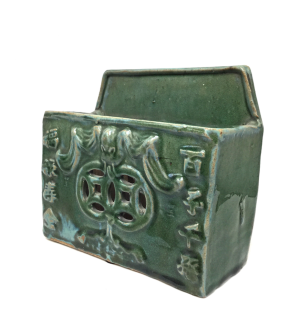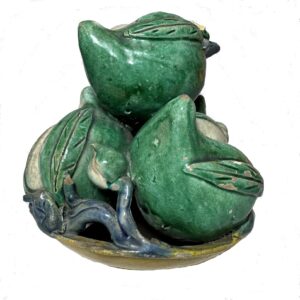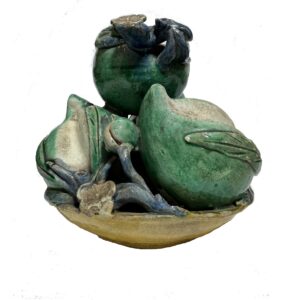Showing 13–24 of 41 results
-
Sale!


$385.00 Original price was: $385.00.$325.00Current price is: $325.00.
Ht: 8.5” W: 15” D: 9” | CALL 213-568-3030 OR EMAIL [email protected] FOR SHIPPING COST
Given the auspicious images on this finely crafted red and gilt jewelry box -a lotus and 5 bats surrounding a longevity roundel, it was probably a wedding gift for a fortunate couple as a wish for longevity, fertility, harmony and many and sons.
-
Sale!


$695.00 Original price was: $695.00.$525.00Current price is: $525.00.
H: 7.25 ” W: 3 ” D: 1.625 ” | FREE SHIPPING WITHIN CONTINENTAL U.S.
Finely carved Kitchen God and his wife, mirror images on backless chairs with multi-sided pedestals reflecting reverent and responsibility to protect the home. Naturally darkened lacquer, soft patina. Male with consecration covering, female open with contents. Unique house warming/wedding gift.
-
Sale!


$695.00 Original price was: $695.00.$525.00Current price is: $525.00.
H: 7.75 ” W: 2.875 ” D: 1.875 ” | FREE SHIPPING WITHIN CONTINENTAL U.S.
Husband and wife Kitchen Gods are near mirror images with similar layered gold officials’ robes, clasped hands covered in ritual cloth. Excellent condition, fine patinas. Consecration script remaining in wife’s cavity but not in husband’s.
-
Sale!


$785.00 Original price was: $785.00.$650.00Current price is: $650.00.
H: 7.75″ W: 3.25″ D: 2.375″ | free shipping within Continental U.S.
Finely carved this Kitchen God and his Wife monitor family members from their perch above the stove. Near mirror images with layered gold officials’ robes they symbolically hold tablets to report about the family to the Jade Emperor on Chinese New Year. enhance feng shui. Kitchen Gods especially pairs are now rare and very collectible and make unique wedding and house gifts.
-
Sale!


$595.00 Original price was: $595.00.$425.00Current price is: $425.00.
H: 16.375″ W: 13.625″ D: 5.75″ | FOR SHIPPING INFORMATION CONTACT US AT 213-568-3030 or [email protected]
Extremely ornate black lacquer cabinet with intricately carved doors, and gilded openwork panels with opening to red lacquer, gilt fringe interior with backdrop with Chinese scenes. Display of status and piety, designed as dignified display for honoring ancestral spirits.
Intricately carved black and heavily gilt cabinet is a fine example of a Straits Chinese furniture Carved openwork panels with phoenixes and lotuses are symbolic wishes for harmony, blessings, rank, good fortune; outstretched wings wish for harmonious marriage, many sons and the inside decoration a wish for status and successful career. Although somewhat flamboyant, it is a unique accent piece and great gift for newly weds.
-
Sale!


$450.00 Original price was: $450.00.$325.00Current price is: $325.00.
H: 22 ” W: 21.5 ” D: .12.25 ” | FREE SHIPPING WITHIN CONTINENTAL U.S.!
Small Fujian elm cabinet made for the China’s new wealthy merchant class in 18-1900s . Red lacquer with auspicious symbols for the Five Happinesses: health, wealth, longevity, virtue and a peaceful death. Were often gifts for newlyweds as desire for double happiness and fruitful marriage with sons.
-
Sale!


$695.00 Original price was: $695.00.$495.00Current price is: $495.00.
Ht: 20.75” W: 19.125” D: 11” |CALL 213-568-3030 OR EMAIL [email protected] FOR SHIPPING COST
Fine ladies vanity cabinet covered with red lacquer and gold highlights. Parents’ gift to newlyweds with auspicious symbols for happiness, long life and having sons reflecting Confucian belief that producing sons to carry on the family name is essential to happiness.
-
Sale!


$435.00 Original price was: $435.00.$375.00Current price is: $375.00.
Ht: 15.25″ W: 11″ D: 4.875″ | CALL 213-568-3030 OR EMAIL [email protected] FOR SHIPPING
Parents often gave small red and gold carved cabinets as wedding gifts as a wish for the young couple to have many sons. The peony is a metaphor for female beauty and fertility, a willow represents spring – season of youth, new beginnings, optimism and fertility.
-
Sale!


$145.00 Original price was: $145.00.$125.00Current price is: $125.00.
Ht: 6.25” W: 5.5” D: 3.25” | FREE SHIPPING WITHIN CONTINENTAL U.S.
The Chinese characters within a circled seal in the mold on the bottom indicate this teapot is an antique. As the thin ribbon blue collar as wishes for long life, it is a perfect birthday gift. Recommended for decorative use only.
-
Sale!


$895.00 Original price was: $895.00.$695.00Current price is: $695.00.
H: 10″ W: 7.75″ D: 8.25″ | FREE SHIPPING WITHIN CONTINENTAL U.S.
Rare single image of Kitchen God and wife, indicating their close/lasting relationship as family’s protectors. Detailed elaborate officials’ robes, headgear. Individually portrayed holding hu tablets like those held by high court officials or Taoist priests.
-
Sale!


$185.00 Original price was: $185.00.$135.00Current price is: $135.00.
H: 7.125″ W: 8.375″ D: 3.75″ | FREE SHIPPING WITHIN CONTINENTAL U.S.
Shiwan 2 part chopsticks holder with top holes for hanging and bottom ones for drainage. Chopsticks were wedding gifts from mothers to daughters with auspicious wishes: sons as soon as possible, blessing for prosperity, happiness and fertility, life-giving rain and abundance.
-
Sale!


$395.00 Original price was: $395.00.$275.00Current price is: $275.00.
Ht: 5.5” Dia: 6” | FREE SHIPPING WITHIN CONTINENTAL U.S.
Shiwan stoneware peaches and lotuses on footed bowl auspicious symbols associated with springtime, fertility, long healthy life for many generations and therefore are propitious gifts for birthdays, especially for the elderly.
End of content
End of content

